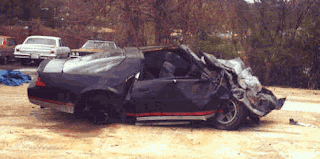This is the sign in Germany that indicates no speed limit (yippie!)
It is an amazing system. It is efficient, it is fast and, unfortunately, it would never work here.
The first thing that you have to understand is that the Germans have a different view of driving. Here in North America you will find people texting, eating, applying makeup and all doing all sorts of odd things behind the wheel. It was not that long ago that German cars didn’t even come with cup holders. In North America they have caught people, texting, eating, watching movies. It becomes easier with automatic transmissions and cruise control. People become dissociated from the driving process. It is like they are watching TV or playing a video game.
Unfortunately not a unique sight on Ontario roads
In comparison, the Driving Licence in Germany costs over $2000 and requires 25 – 45 hours of professional driving instruction and 12 hours of driving theory. The driving instruction must include autobahn, city and night driving. The questions on the test are about mechanical aspects of the car as well as regular driving theory. With everything they have to go through to get their licences it is easy to see why they value them so much.
There is also a huge difference in the vehicles you see on the road. Here in Ontario we can see some rough cars on the road. They do have to get their exhaust system checked every two years but the rest of the car only has to be checked if the ownership is changed. The police can order vehicles to be inspected but you generally only see this happen in extreme situations.
In Germany you rarely see a car that is not in pristine condition. Part of this is due to the German pride, they really believe in doing things right if you are going to do them. They are also required to put their cars through a rigorous inspection every two years. It is notoriously tough. Cars can fail for having a broken light or even a dent in the wrong spot.
The German roads are also in great shape. They are planed with speed in mind and are well maintained. Here in Ontario they regularly run competitions to find the worst potholes in the province. There is a lot of competition. Some of them are inconvenient. Some of them are suspension killers. Many of them sneak up on you. There is nothing quite like that feeling when your tire drops ½ way to Australia when you are not expecting it.
A very pretty stretch of autobahn
Again this is a little easier for our German friends. Here in Ottawa we have a temperature range that runs from 40 above to 40 below Celsius. That can take quite a toll on anything. Then you have to factor in the damage done by snow plows and tons of salt. We could have perfectly maintained roads but we really wouldn’t like the taxes we would have to pay for it.
If we wanted to move to a system like they have in Germany here it would take a lot of time to transition. If they just flipped the switch and let us rocket down they highways as fast as we want, the roads would be filled with carnage and emergency vehicles. Just imagine all the rusty 1995 Cameros , all the fast and furious Honda Civics and all the soccer moms in their mini-vans running late for something. Now imagine them all fighting for fast lane supremacy. You also know that there would be some fool in the passing lane going exactly 100 km/h to slow down those crazy drivers.
Sorry, the mullet got in my eyes
At one point in Montana the daytime speed limit was “whatever is safe and reasonable”. This allowed the police some latitude. If they felt that somebody was driving too fast for the driver’s experience, the driver’s car or the road condition they could issue a ticket. Some felt this was unfair but it allowed the police to keep the highway from turning in to a scene from Mad Max. The federal government in the states put an end to this when they threatened to withdraw highway funding from any state that did not keep a tight rein on their speed limits.
Will we ever see autobahn style regulations in Canada? It isn’t likely. Before we saw anything like this there would have to be fundamental changes in how we as a society view driving and how we regulate what vehicles can be on the road. There is not much social pressure to move in this direction. There is a push towards more regulation, more arbitrary speed limits and more cameras. This allows the do-gooders to feel like they are saving the world and it increases revenues coming from speeding tickets. It also allows the car insurance companies to charge more. There are a lot of economic incentives to keep things as they are. More’s the pity



